Introduction
The year 2021 began while the world has not yet recovered from the effects of the pandemic that changed everything. The Media Center for Persons with Disabilities (MCPD) had sought to deliver the essential information and messaging that helped the Persons with disabilities (PWDs) in Yemen to address those changes. The MCPD, as the first media institution specialized in advocating for PWDs, to raise the community’s on how to deal with PWDs during home isolation and quarantine.
At a time when the world was burdened with overcoming the effects of this disaster, the PWDs in Yemen were facing another 7-year-old disaster. A war that was described as the worst and most tragic and PWDs were the most affected by it. Some of them had lost their lives, others lost their chances of education and there are those who lost access to medicine.
In the midst of these difficulties and at the beginning of the year the MCPD was launched, with full confidence and belief in its mission that will save this group from society’s ignorance of its rights and from the stat’s neglect and disregard of its legal obligations towards this group, which represents 15% of Yemen’s population.
The MCPD’s mission was to produce human rights content in all forms written, visual, audio, and video, and has overcame all obstacles and performed its role with high professionalism.
Our production saw a hug development and was close to the concerns of PWDs in all of Yemen’s governorates. Our content gained great following and admiration and contributed positively to the lives of PWDs and their communities.
In this report, you will find an overview of what the MCPD has accomplished during the year, including reports, news stories, and advocacy campaigns in general as well as advocacy campaigns for women with disabilities in particular.
You will also know about the most important opportunities and participations undertook by the MCPD. A summary of the most important statistics and the quantitative as well as qualitative impact of our work based on social media statistics, testimonies from followers, guests and other sources shown next to each statistic. You will also find pictures and infographics to illustrate this.
Before we begin the report, we would like to draw your attention to the fact that the MCPD did all these works with the self-efforts of our team, of which 70 percent are PWDs. We believe in our right as PWDs to access information, make our voices heard and fight for our rights with the force of the media and free speech so that we can: Integrate ourselves into society, reach the status of equal citizenship with all members of society and participate in the peacemaking process in our country. We draw our strength from the international conventions represented in by the Convention on the Rights of Persons with Disabilities (CRPD), the other relevant laws and charters, our capabilities represented in our voices and pens strive and fight with these weapons until we reach our goals, we will also reach our goals with you standing next to us and with your support and backing of our efforts.
Producing Written Content
The written content is one of the most prominent works produced by the MCPD. This part of the production depends on press reports, features, news stories, newsfeeds, publications and awareness campaigns. The year 2021 was full of achievements in this field, which we will show in the coming lines.
In-depth reports
The MCPD produced, during the year 2021, (71) in-depth press reports aimed at advocating and empowering PWDs to access their rights.
These reports included 71 issues which were researched and analyzed in depth to discover their cases, effects and remedies. Also, these reports approached the various roles of governmental, non-governmental institutions as well as national and international organizations in the protection and promotion of the PWDs rights in Yemen based on the International Convention on the Protection of the Rights of Persons with Disabilities and the relevant international and local conventions, to enable this group to convey its voice to various parties and at the highest levels.
The issues raised in these reports varied according to the diversity of concerns and rights of PWDs in Yemen, and we will try to show some of those topics:
First / health press reports
Since we produced (10) health reports that discussed medical errors that cause disability and who is liable for them. We also touched on the issue of the rights of PWDs in exemptions from fees in hospitals, as well as the need to provide medicines for them and for health authorities to play their role.
We did not forget to talk about PWDs because of the war and the necessity of prepare physically and psychologically. Our reports discussed the great neglect suffered by this group, and we held the various parties to the conflict responsible for this.
Secondly, the reports that discussed about education
The MCPD’s team worked on producing 15 reports that highlighted the various issues and educational rights of PWDs and touched on school fees exemptions and preparing schools and universities to be PWDs accessible. In addition to adapting PWDs-accessible curricula to allow PWDs to access educational information easily and conveniently like other members of society. We also visited educational facilities and closely saw and touched the pain of PWDs and conveyed them into press reports and stories from the depth of the tragedy.
The massive impact of the war on the education of PWDs were strongly present in our monitoring and writings, as we wrote about the damages suffered by the centers and institutions of PWDs and how this was the reason for them to stop performing their role towards this vulnerable group and reversed the years of development that was gained by the PWDs and had rid them of the complex social isolation and of sitting at home which returned now due the current war.
Accessibility and inclusion in the community, as well as economic and political empowerment, children’s rights, and events and occasions related-reports were also topics discussed and explored in this year, as well.
Feature Stories
The MCPD believes in the great role of stories in inspiring societies, delivering the messages and motivating those who are desperate in their hearts, whether they are PWDs or people in their community. Therefore, we produced 15 press stories that focused on the successes and achievements of some PWDs, as well as stories of charity and giving despite the difficulties faced by their protagonists. The MCPD has addressed these stories from a human rights perspective that is far from the mercy and pity attitude and the distorted media approach that has been used in other media outlets which are not specialized in the issues of PWDs.
In these stories, we hosted 15 persons with different disabilities and in different governorates and in various walks of life to show the creativity of PWDs to communicate them to the world.
News and Follow-ups
The MCPD covers all news related to PWDs, especially news that focuses on real achievements and inventions, and those that address issues of violations against PWDs that occur in various Yemeni governorates as a result of the war.
40 press articles were produced, 20 of which were exclusive articles first broke by the MCPD and were later covered also by the MCPD.
As for the newsfeeds, we followed 36 local and international topics, all of which were inventions, facilitations, inspiring events and prizes won by PWDs in order to connect our audience to the news and achievements around them.
Video and multimedia production
During the year 2021, the MCPD produced 28 human rights and awareness videos with a total duration of 130 minutes. The number of visuals reached 354 images that accompanied the various publications and materials.
As for the graphics and designs, there were 115 designs and charts throughout the year, with the aim of delivering the MCPD’s messaging in various ways and to different viewers.
Audio Production
The Badi and Amal radio series, which was produced by the MCPD in 30 radio episodes and was aired on 13 local radio stations, was the first series specialized in discussing the issues and rights of PWDs in Yemen in a simple, colloquial manner that reaches all levels. 15 young men and women participated in the production of the series, 70% of whom are PWDs with visual and motor disabilities. Also, 50% of the team were females.
The series was aired in Sana’a, Hadramout, Aden, Hodeidah, Marib, Shabwa, Al-Mahra, Ibb and Taiz. This series had a great impact in changing societal awareness of the rights and issues of PWDs because it raised sensitive and realistic issues in the same manner and dialects that reaches the hearts of listeners in rural and urban areas. The series touched on issues and concerns in various northern and southern rural and urban governorates, such as violence against girls with disabilities as well as imprisonment, torture, restriction of freedoms, access obstacles and more.
The MCPD also produced 6 flash messages and audio remarks related to awareness that were published on the MCPD’s pages on social media and on some radio stations. Those flash messages and audio remarks were linked to special events for PWDs such as White Cane Safety Day, International Day of Sign Languages, and several others.
The total length of the MCPD’s audio production 38 types of content, with a total duration of 300 minutes.
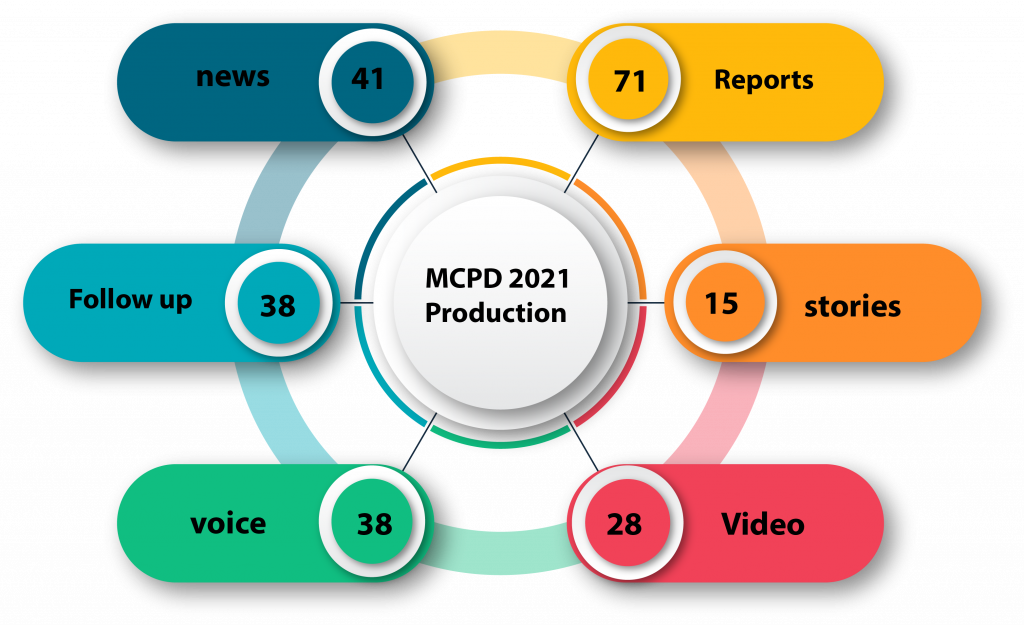
Issues of Women with disabilities
The MCPD pays great attention to women because of the injustice they suffer due to being women first and disabled second. Women are the most vulnerable population group and empowering them as well as advocating on their behalf is one of the most important things we seek to accomplish.Therefore, the MCPD produced 18 reports related to women’s issues and 6 success and creativity stories for women with disabilities.
In addition, women are present in all kinds of press coverage as guests, sources of information, opinion leaders, on an equal basis with men.
The MCPD’s staff comprises 50% females with disabilities who are also media professionals which is an intended move within a broader effort to empower women in larger way to ensure their presence as content makers, especially when they have gone through the same suffering faced by their female peers with disabilities.
Not only that, but the MCPD worked on advocating issues of women with disabilities, based on our responsibility as media institute and human rights defenders we published and advocated the case of activist Aisha Jubari from Taiz governorate, whose house was stormed by a military person and she and her aunt were attacked. Upon following this issue and communicating with various authorities and publishing the details of this incident on the MCPD’s website, the perpetrators were arrested and brought to justice to receive their punishment.
Najeba Al-Shaibani’s case is another example of the issues that were advocated by the MCPD. The injustice and violence that she was subjected to was stopped. Najeba was assaulted by a security point staff in Taiz, on the pretext that she works in filming military sites. Najeba a is a person with disability, she lives with a motor impairment. She contacted the MCPD which introduced her case to the public opinion and many media professionals sympathized with her. Following that she received a formal apology.
As the MCPD undertakes these efforts in the field of women’s advocacy, it aspires to expand this work and advocate for all issues of women with disabilities until they receive all their rights and get rid of the restrictions imposed on them.
The MCPD is keen on intensifying its media and human rights efforts regarding the issues and rights of women with disabilities in Yemen thus it launched the first human rights journalism competition titled: Women with disabilities: Issues and Rights. The MCPD called on all journalists working in media outlets to actively participate in this competition and produce reports and stories on this topic.
This comes with the aim of encouraging other media outlets to write and produce about issues of PWDs in general and of women particularly. We also aim to encourage women themselves to speak about their issues without fear.
Events
The MCPD’s team has devoted part of its efforts towards holding events and activities dedicated to empowering PWDs and discussing their issues with various parties in the hope of changing the painful reality experienced by this group which accounts for more than 15% of the population in Yemen, and for that purpose we have held the following events:
1- Holding a virtual symposium via Zoom on the topic of bullying against children with disabilities. The symposium was attended by 70 persons, 30 of them via zoom, and the rest watched it on our Facebook page
2 – Holding a human rights competition through the MCPD’s websites and social media pages in the blessed month of Ramadan, where the competition was an opportunity to attract more followers and audiences to what the MCPD’s and its content, in addition to significantly increasing the followers of our pages. 5,000 people participated in the competition, according to the Facebook posts statistics, and 15 male and female contestants from different Yemeni governorates won.
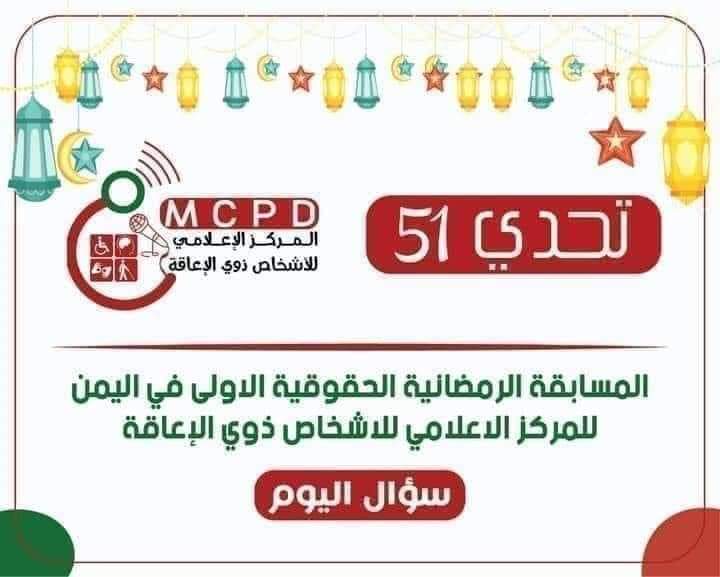
3- Holding a journalism competition for Yemeni journalists on the issue of women with disabilities, which lasted for a whole month, in which 35 female and male from 35 media outlets participated.
4 – Holding a human rights literary symposium on the anniversary of the passing Yemen’s great blind poet Abdullah Al-Baradouni,, which addressed his life, his disability, and his media and legal philosophies and referred to the utter neglect of this poet by the competent authorities
The MCPD is the only institution that commemorated this poet who enriched the Arab and Yemeni library with countless books and poems. Many prominent poets interacted with the symposium. The great Yemeni poets Al-Harith Ibn Al-Fadl and Dr. Muhammad Al-Kumaim presented working papers, as well as several others. The symposium was attended by 41 interested persons, including academicians, poets and PWDs.
5- Organizing an event to honor the male and female journalists who participated in the human rights competition under the title “Women with Disabilities: Issues and Rights.” The ceremony, which was held at the MCPD on (14-November-2021), was attended by about 35 persons including governmental officials, institutions concerned with disability, and journalists. Many media outlets interacted with the event by publishing content about it and promoting it
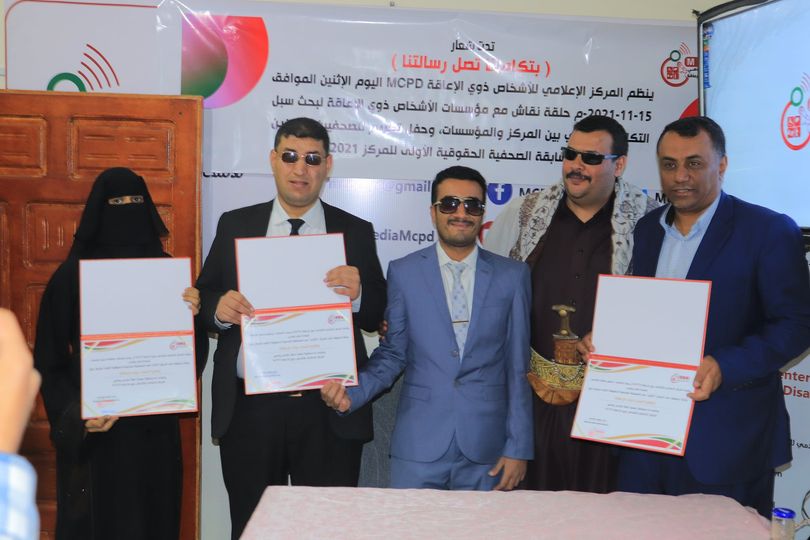
6-Holding a panel discussion between the MCPD and organizations for PWDs on the media discourse directed towards PWDs. The event was held at the MCPD’s HQ with participation from 17 PWDs institutions as well as the chairperson of the General Union of the PWDs Associations in Yemen.
Discussing the mechanism for properly improving the media discourse and how to create and integration between the MCPD and the PWDs institutions in order to make the PWDs voice heard and exert pressure on various relevant parties in order to obtain rights of PWDs and deliver their message.
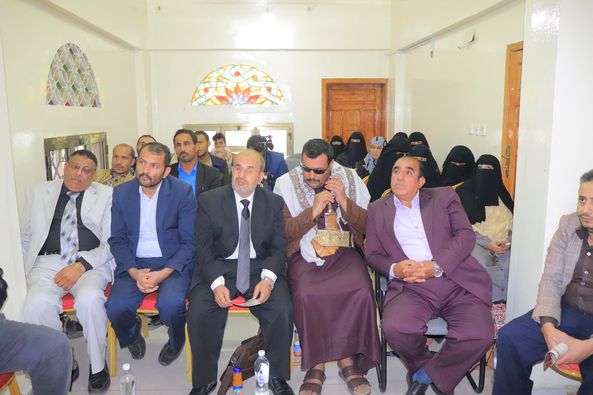
7- A virtual meeting with Tim Lenderking, the US special envoy for Yemen. This year was concluded with a Zoom meeting about the ways and mechanisms for integrating PWDs in peacemaking efforts in Yemen. The meeting was attended by Sara Minkara the U.S. Special Advisor on International Disability Rights, in addition to 6 institutions and initiatives for PWDs as well as individuals who suffer disabilities caused by the conflict. The meeting participants submitted a number of messages to the US envoy to deliver them to the warring parties in Yemen and the international community. The US government stresses that PWDs are the unfortunate result of this war and they are the ones who pay the highest price as a result of its continuation. Therefore, they have the right to participate in the consultations and negotiations regarding the comprehensive peace process in Yemen

Some of the participations and opportunities undertook by the MCPD
1 – Participating in the training program of the Arabic Mentoring Center for Media Startups in the Middle East and North Africa and the International Center for Journalists (ICFJ), which lasted for 6 months, as the MCPD was among 8 institutions in the Arab world that won this competitive opportunity, for which more than 200 institutions competed

2 – Acceptance into the training program of the Center for Studies and Economic Media on the sustainability of media institutions, which targeted 25 media institutions in Yemen. We were one of the recipients of this competitive grant.
3 – Partnership with four institutions for PWDs in Sana’a, Aden and Hadramout, and this was done to help us achieve the goals we seek.
The MCPD attended and participated in a number of conferences, events and workshops that were held this year, such as the ARIJ Virtual Forum, the training camp held by the Arabic Mentoring Center for Media Startups in the Middle East and North Africa, and the National Model United Nations. Many media outlets that interacted with our activity and wrote about the MCPD. You will find links to those posts at the end of this report.
Summary
The MCPD makes every effort to bring about a positive change in the PWDs lives and to change the society’s view of this group. The center also seeks to change media concepts towards PWDs, which will lead to the emergence of a media discourse that respects PWDs and believes in their rights as well as contributes to raising awareness of PWDs to accept this group and belief in their abilities and creativity.
Here we will list some of the positive effects of what we are doing
Quantitative effect
We will show in brief points the level of interaction with our content via some figures:
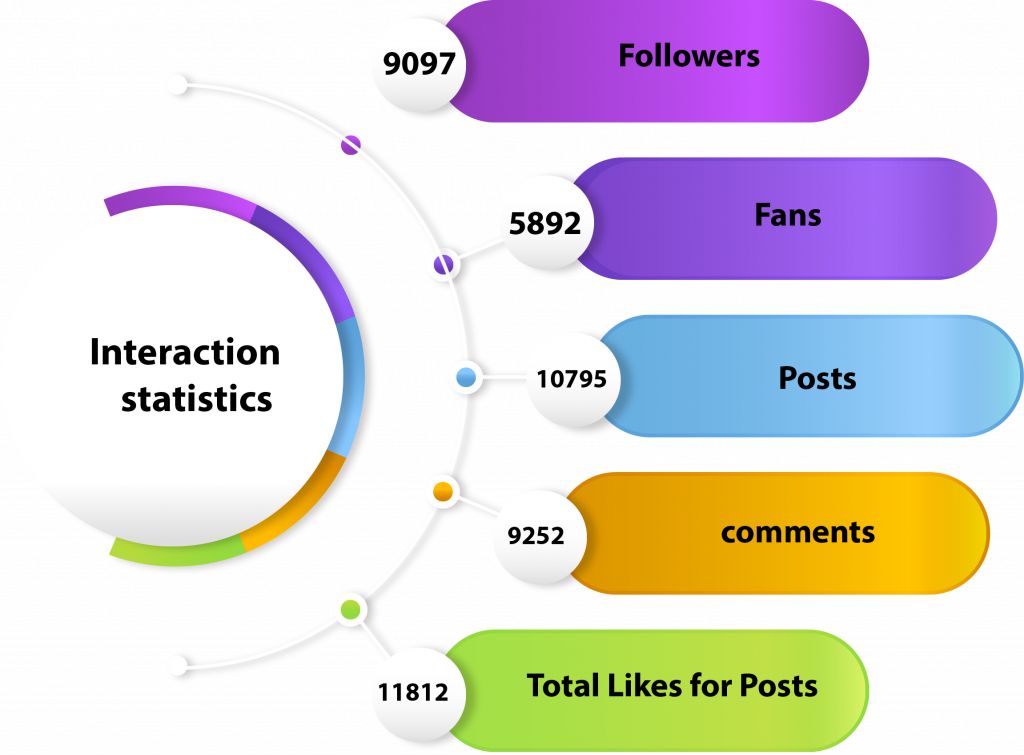

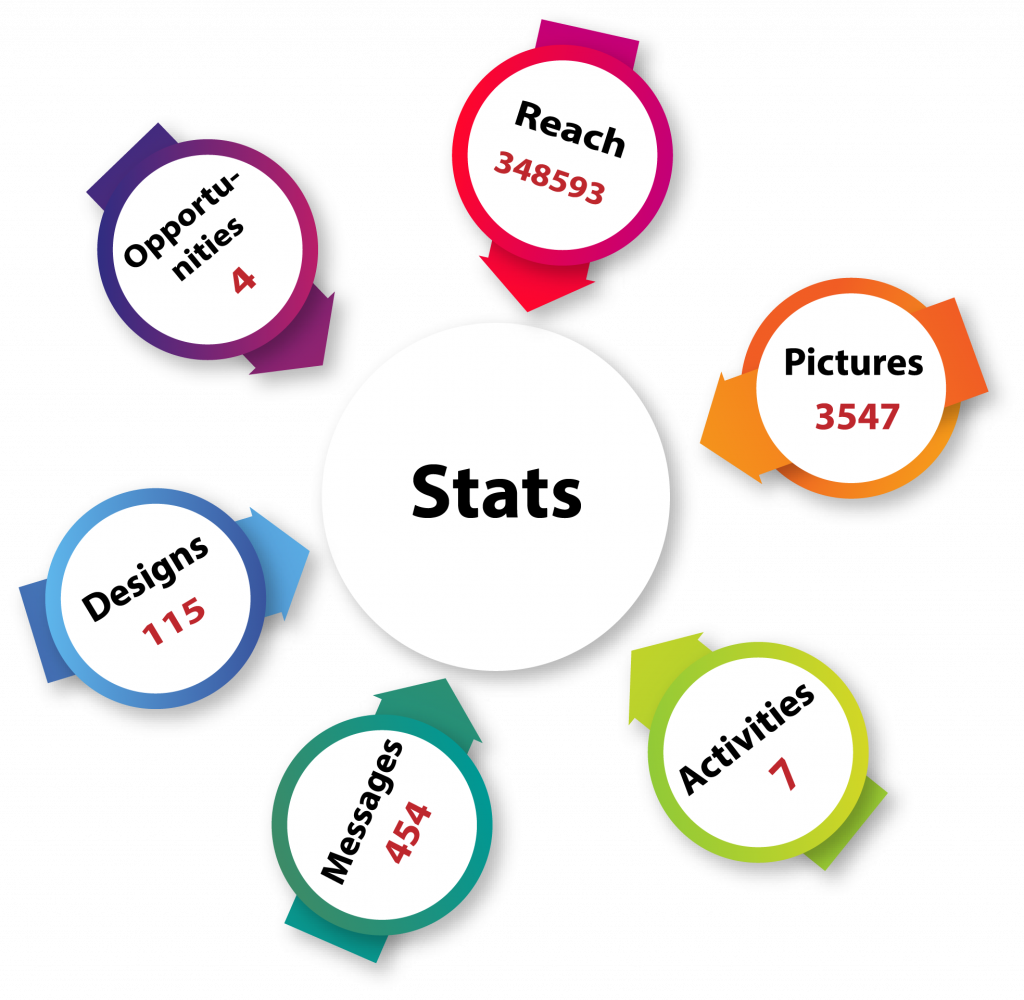
What changes have been felt by PWDs which we were able to know
and reach them, and they were
1- The change that our guests experienced is in the success stories.
For example, Ali Al-Wajeeh, who has a motor disability, was hosted in a video produced by the MCPD about a change in Ali’s life. The positive change came as a result of an initiative by the people in his neighborhood who created safe paths through which he can pass to the places he used to go such as the mosque and the market. Ali also talked about the change in the community’s view of him, as they now involve him in their discussions and gatherings.
2 – Ziyad Al-Ghani is another success story hosted by the MCPD. He is an electrical engineer and he spoke about people who contacted him after watching the video and asked him to repair some of their equipment. He says that his work has developed relatively and he still hopes for a lot.
3- Pressuring the Fund for the Care and Rehabilitation of the Disabled to reverse the decision to integrate all people with disabilities into schools, as we, in cooperation with some institutions with disabilities, moved to prevent this ill-considered decision that affects students with disabilities, and this decision was actually reversed.
4- Bringing justice to the case of activist Aisha Jubari and exonerating her.
5- Making the case of student Najeba Al-Shaibani a public opinion case. Najeba who was assaulted by a soldier in Taiz governorate after he accused her of filming military locations. After we our followed the case, it became clear that it was a false accusation, thus, Najeba was exonerated and received a formal apology.
